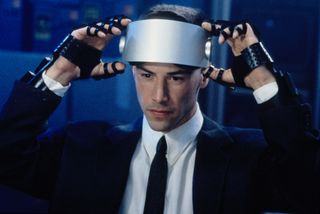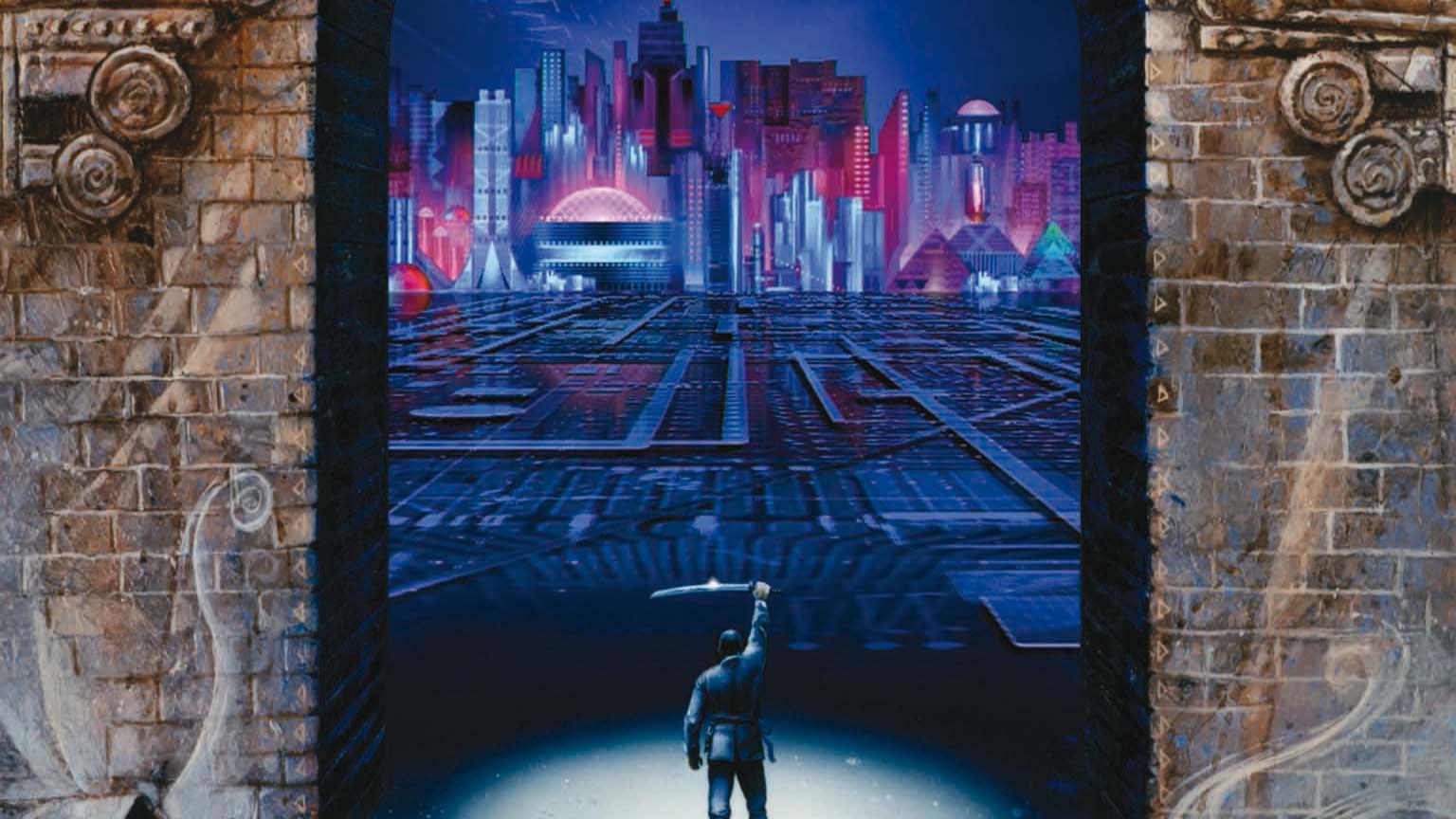The metaverse is bulls**t | PC Gamer - williamshervelp
The metaverse is bullshit

We have Neal Stephenson's 1992 new Snow Crash to give thanks for popularizing avatars as our integer personas, from early internet message boards to overfull-body VRChat. We too have Snow Break apart to blame for the downright perdition we find ourselves in today, arsenic every tech billionaire on the planet slobber over themselves as they declare the metaverse—the incoming phase of anthropoid culture!!—is within grasp. Games, NFTs, crypto, VR, Land of Opportunity, the blockchain, they're all wrapped aweigh in this idea of a virtually-integrated society in which our Fortnite costumes testament carry over to our Onlyfans accounts and we will never, ever have to log polish off.
The absurdness of IT makes me lack to cry, or maybe die, or maybe just spoon prohibited the set out of my nous that knows what an NFT is. But there's one thing that keeps Pine Tree State expiration:
The absolute gleeful, cackling, deep-in-my-bones certainty that it's all complete bullshit.
If you also know deep in your heart that the metaverse is a sizable sebaceous steaming load of billionaire nerd pabulum, I hope meter reading these words provides you with a Wave of vindicating comfort. You're not crazy. I know it can feel like that when the people peddling these things seem and so convinced that they're the future, suchlike they know something you don't. Don't fall for it. Watching the great unwashe pass $69 million in fake money to buy a JPEG should make you feel like you're living in an age of unparalleled nonsense.
That feeling isn't going to go away. For the next decade we'll all be asking ourselves if the whole world's gone mad at least once a week. But the good news is that the metaverse and the tech industry's very expensive obsession with trying to pull round a reality bequeath constitute a Schadenfreude generator the likes of which we've never seen before.
We will whol become the living embodiments of the one true manifestation of being online in the 21st century:

Organism 'internal' a virtual world was ne'er rattling the central part
When Epic's Tim Sweeney and Facebook's Mark Zuckerberg peach about the metaverse, they're primarily drawing from the foundational visions of cyberspace created by science fiction authors wish William Gibson and Neal Stephenson. Their books in the '80s and advance '90s looked at what computers were capable of at the time and fanciful them decades in the future tense, just abstract enough to let our imaginations run.
Here's C. D. Gibson's description of cyberspace in Neuromancer (1984):
"A consensual delusion experienced daily aside billions of legitimate operators, in all nation... A graphical representation of data abstracted from the banks of all computer in the human organisation. Unthinkable complexity. Lines of light ranged in the nonspace of the mind, clusters and constellations of data. Like city lights, receding."
And here's a snipping of Stephenson's description of the metaverse in Snow Crash (1992):
"Your avatar can look any path you wish it to, up to the limitations of your equipment. If you're displeasing, you can make your avatar pulchritudinous. If you've just gotten out of bed, your incarnation can noneffervescent be wearing beautiful clothes and professionally practical makeup. You can look like a gorilla or a flying lizard or a giant talking penis in the Metaverse. Expend basketball team minutes walking down the Street and you will see all of these."
Both novels were prescient and profoundly influential. Alongside movies like Tron, they shaped '80s and '90s depictions of what it would look like to be inside a computer, from rudimentary earliest VR to movies like The Matrix. In 2012, Michael Abrash—who has worked at Microsoft, id Software, Valve, and Oculus—wrote that his game maturation career "all started with Bamboozle Crash."
"[John Carmack] talked about persistent internet lame servers," he wrote, "about people building their own levels and running them on their own servers, and about how it would be possible to connect them together so players could go from one to some other... I realized that what he was real talking about was a Metaverse—less glamorous than Neal's creation, simply, amazingly, gloriously, implausibly real."

Men in technical school have been chasing this vision of the metaverse for a age, but their imagination for what qualifies as the tangible metaverse keeps organism pushed far and further to the horizon because they'rhenium chasing a skill fiction vision that never had to be justified beyond a few sentences of enticing description. Beingness "in spite of appearanc" a virtual world was ne'er really the grave split.
C. D. Gibson and Stephenson were conjury ascending spaces that successful for entertaining stories you could picture in your head, where characters could fare things other than sitting at monitors typing. Tech companies are like a sho spending billions of dollars twistin against that basic fact: For most of what we do online, sitting at a monitor and typing is going to cost the most applicatory interface for a very long fourth dimension.
The net equally we know IT is so much larger than Sir Leslie Stephen's metaverse because information technology's *not* just one shared environment
We've had a perfectly useable version of Gibson's internet since the popularization of the World All-encompassing Web in the mid '90s (or sooner if you were into BBSes). We created the metaverse when millions (now billions!) of devices became on-line at the same time, able to access info from anywhere, linking people across continents in mere seconds. The point was never that net needed to expect like the internet in Johnny Mnemonic. Bum you imagine having to use that shit just to make a call foretell?
Hell, even Mel Columcille Gerard Gibson said that his description of cyberspace was in essence sensible supposed to sound very assuredness:
"All I knew about the phrase 'cyberspace' when I coined it, was that IT seemed similar an effective buzzword. IT seemed aware and in essence meaningless. It was suggestive of something, simply had no real semantic significance, even for ME, as I saw information technology emerge on the Sri Frederick Handley Page."
As for The Street, Stephenson's metaverse eq of the Las Vegas strip where anyone can adopt an avatar to escape the crushing reality of their normal existence: That's just fucking Sec Life. We made a virtual world where you can do anything (including beingness publicized to by Toyota) in 2003.
Operating theater perchance The Street is World of Warcraft, or VRChat. The internet equally we know it is so much bigger than Stephen's metaverse because it's not just unity shared environment. IT's immensely more flexible, a connecting medium for whatever broad or niche virtual worlds we want to make.
Why don't the tech billionaires chasing after sci-fi metaverses get that these fictional virtual realities seem great on the Sri Frederick Handley Page but would beryllium hell to actually live in 12 hours a sidereal day? I rightfully do not cognize, but I think it Crataegus laevigata have something to do with their refusal to allow in that they are the baddies.

More than NFTs or cryptocurrency or any of the other brain-melting nonsense busy in the technical school landscape of 2021, this is the part that rightfully makes me deficiency to stick my entire fist in my mouth and bite down. The crusade to make the metaverse, at least from companies like Epic and Facebook, seems entirely built along a teen boy's reading of Snow Crash: zeroing in on the awing vision of future technology patc totally wanting the hold's satiric skewering of capitalist economy.
The very first chapter of C. P. Snow Doss down starts by describing the high tech appurtenance and elite skills of Hiro Protagonist, aka The Deliverator, aka a former computer programmer who at present delivers pizzas, and there is only one pizza company, running game by the mafia, and near of America has been graven up into corporate fiefdoms.
George Stephenson's writing is so sport that I guess you could, maybe, misapprehend a society run by the pizza pie mafia as a good thing. But Tim Sweeney and Mark Zuckerberg wear't see themselves as pizza mob bosses. They keep floating these visions of a Laputan metaverse that's all active multitude speech one another in a virtual utopia, even Eastern Samoa they sit atop big companies that use slews of money to reshape the internet as they see fit.
In a September 2021 Booker T. Washington Position interview, Tim Sweeney unreal the future of advertising. "A carmaker WHO wants to make a bearing in the metaverse International Relations and Security Network't going to ply ads," he aforesaid. "They're leaving to drop their car into the world in real time and you'll be able to drive it some. And they're going to work with lots of content creators with different experiences to ensure their car is playable Here and there, and that information technology's receiving the attending it deserves."
But how is a virtual car tempting you to drive it in the metaverse—aided by an army of "cognitive content creators"—any ameliorate than watching a YouTube pre-revolve adver? Extrapolate this unsuccessful, and the metaverse will Be a place where advertizing and authenticity are straight-grained harder to tell obscure. It's a commercial dream, not a creative one.
If Facebook—sorry, Meta—is one of the key drivers of the metaverse, then of course it wish have much new whirl connected the ad-laden news feed. It'll just be a natural extension phone of the gig economic system, some unprovided for soul being paid .00000000001 bitcoin an hour to virtually deck out like a carnival barker and cry out about the a la mode horrible news out of Syria happening some virtual street corner. And if Epic in some way created Sweeney's utopian metaverse, information technology would still be well-stacked to encourage Epical's personal interests and profit above all other. There's no way for whatsoever massive tech company to build the metaverse without comely the villains.

Perhaps the most cited title almost the metaverse as it pertains to gaming is that it's the key to unification our digital lives into an ur-account. The magic of the blockchain wish then let us, say, "own" and access the same weapon system across Diablo and New World, or sell the peal we dog-tired a month attrition to pose for real money (and aside real money I mean cryptocurrency that constantly fluctuates in suppositional value). This hyped rising interoperability ignores approximately a thousand problems with how games are made.
MMO veteran Raph Koster has recently written a series of articles breaking down how game objects work, and he tackles the many difficulties of making even simple items carry between games. "We should not underestimate the order of magnitude of the task of figuring out what value a cooked Proto-Indo European from Breath of the Wild has in Halo—operating theater mapping every gritty to all other game," he says.
"There are no standards mighty like a sho for 'what things can do' in a virtual world, and we shouldn't want them. The act of scene the standard is too setting the limit, which would curb creativity enormously. There's far to a fault much possibility to comprise explored notwithstandin."
Koster does go connected to discuss how it can work, just technical possibility unmoving runs headfirst into design challenges, even with something A simple as, say, an apple. For example: "If you can sway food to a new world and feeding restores health, that power really unbalance a game where you aren't supposed to be competent to heal at all." Beaver State: "A survival game might deficiency actual nutritional values rather than a individual 'food' value."
Does all metaverse-compatible game meet become a mushy Fortnite chunk of everything mixed together? During Facebook's metaverse presentation, John Carmack known as metaverse development as it exists today "a honeypot trammel for architecture astronauts," aka "programmers or designers who lack to only attend at things from the very highest levels."
The people currently hyping this technology seem to possess little or no get even making "normal" games that preceptor't hand-to-hand struggle with these problems, American Samoa if citing the right buzzwords give the axe make an idea reality. Take Decentraland, a Second Life for crypto fans that was barren when we explored it last class. It apparently has enough life in it to hold an in-bet on festival with Deadmau5 and Paris Hilton DJing just this month, which this metaverse-focused blog put it, the fete "really showcased what amazing feats can be achieved within Metaverse spaces."
It looks like a real party:
There are lot of other blockchain-based games. The Six Dragons, for instance, which looks like the fake version of Skyrim someone would mock risen for an instalment of Law & Order (a common aesthetic in these circles). These games typically commercialize themselves on the plain novelty of being "decentralized" or player-closely-held in around vague way, but I've yet to see unmatched pitch itself as a unique videogame. The metaverse can't survive just for the sake of justifying itself.
Someone alive on the planet earth whitethorn Be healthy to convince me that the metaverse truly is the future of human interaction. Preceptor Draper could serve information technology, and make Maine weep in the process. But so far IT's clear that in the same elbow room William Gibson coined net equally "evocative and in essence meaningless," the Zuckerbergs and Sweeneys pitching the metaverse claim IT's the future without any credible arguments for wherefore information technology should exist.
What set we genuinely have to gain aside trying to merge every last entertainment into one giant Ivan Ooze of content?
Zuckerberg calls the metaverse "an embodied cyberspace where you're in the experience, non just looking at it." Has helium used the internet? Actually? How more of it would you like to embody?
Zuckerberg talks a lot of shit about screens, but the neat thing about screens is that they only require a portion of your attention, not complete sensorial immersion.
In an hour-and-a-half tonic, the only real ideas Facebook presented for living in the metaverse were having a essential version of your house (made dormy of crappy 3D rendered objects), attending virtual meetings (so you can't even turn out your photographic camera if you're feeling Zoom fatigue) and having a virtual workspace rather of a physical one (ne'er mind how clunky and unwieldy a virtual desktop is compared to a real one). Such evolution on the metaverse is focusing happening recreating worsened versions of things we already have in the real world. This metaverse gear, seemingly, is barely another avenue for selling masses the same crap.

In an consultation earlier this yr, Sweeney same that the killer feature of the metaverse volition be "you and your friends together having great social experiences" and "being in a 3D world, interacting together." He uses Fortnite as an exercise. But what about the metaverse bequeath make that experience better? We've been playing games and chatting for decades! What do we genuinely give to gain by trying to merge all entertainment into one big Ivan Ooze of content?
Interpersonal media and telecommunication companies are testify decent that consolidation is bad. Even when we get awing AR glasses that let U.S.A play a more realistic Pokémon Go, I don't need that Pokémon to carry over to my crappy metaverse mansion. Even when we get psyche computing device interfaces, I wear't want to live in the embodied internet, because touchable sensation is a huge portion of how we experience the world, and clicking a mouse feels better than making a thumb gun in empty air.
Tech companies are going to keep pushful the metaverse, and one of these days we'll all have to deal with it. Only in the meantime, don't look the likes of you've lost your mind when every sales talk for it feels absolutely meaningless. The metaverse is most in spades bullshit.
Source: https://www.pcgamer.com/the-metaverse-is-bullshit/
Posted by: williamshervelp.blogspot.com



0 Response to "The metaverse is bulls**t | PC Gamer - williamshervelp"
Post a Comment